2010 Value SSD (~$100) Roundup: Kingston and OCZ take on Intel
by Anand Lal Shimpi on June 3, 2010 12:01 AM ESTSequential Read/Write Speed
Using the 6-22-2008 build of Iometer I ran a 3 minute long 2MB sequential test over the entire span of the drive. The results reported are in average MB/s over the entire test length:
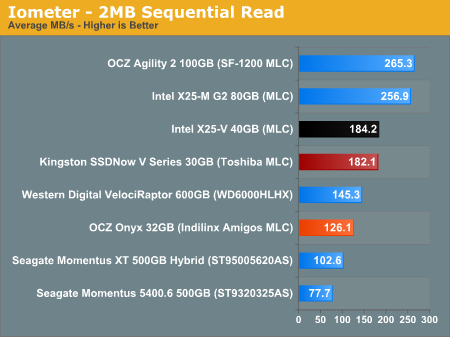
Sequential read/write performance suffers on these entry level drives. Remember that these drives hit their low capacities (and price points) by leaving half of the NAND channels unpopulated, which means in situations where you've got a ton of data to transfer in parallel you're going to be slower than a high end SSD. In read speed the Intel and Kingston drives are limited to around 180MB/s, still faster than any desktop hard drive. Sequential write speeds are slower than 2.5" hard drives however:
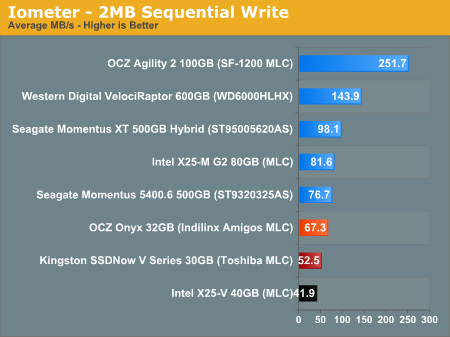
Random Read/Write Speed
This test reads/writes 4KB in a completely random pattern over an 8GB space of the drive to simulate the sort of random access that you'd see on an OS drive (even this is more stressful than a normal desktop user would see). I perform three concurrent IOs and run the test for 3 minutes. The results reported are in average MB/s over the entire time.
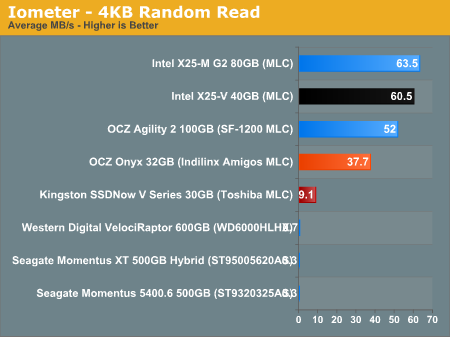
Improved random read and write performance are SSD advantages. Even the cheaper drives hold this advantage over the fastest hard drives. While the 600GB VelociRaptor is stuck at 0.7MB/s in our random read test, Intel's X25-V delivers 60.5MB/s. The best performer here out of the value drives is the Intel X25-V, followed by OCZ's Onyx.
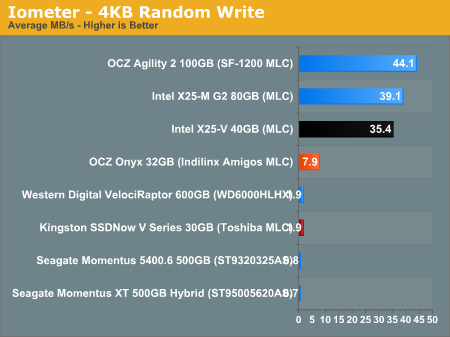
Many of you have asked for random write performance at higher queue depths. What I have below is our 4KB random write test performed at a queue depth of 32 instead of 3. While the vast majority of desktop usage models experience queue depths of 0 - 5, higher depths are possible in heavy I/O workloads:
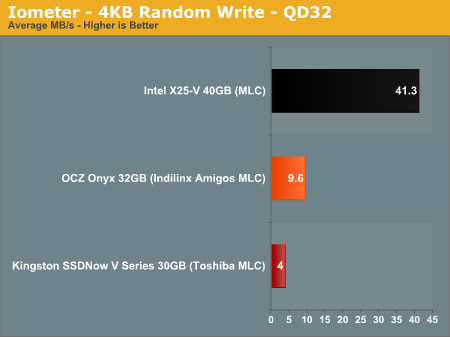
All of the value SSDs improve performance as they are able to extract more parallelism out of the data and thus get better NAND/controller utilization, but the standings don't change: Intel is on top, followed by OCZ and Kingston at a distant 2nd and 3rd place.










49 Comments
View All Comments
R-Smith - Tuesday, July 6, 2010 - link
+1Then again, the best idea might be to avoid an SSD because then PC's without SSD's won't seem so slow.
MobiusStrip - Monday, June 7, 2010 - link
"They simply are way to small" TOO. TOO small. T, O, Oracerx_is_alive - Thursday, June 3, 2010 - link
Seems like the 30GB OCZ Vertex is another good option in this price range. If its performance is anywhere close to the 120GB version in your SSD Bench, I wonder if it isn't a better option than the Onyx and the Kingston?Taft12 - Friday, June 4, 2010 - link
Performance of the 30GB Vertex is not close to the 120GB version.Mugur - Thursday, June 3, 2010 - link
Does the non-Intel drives have a tool equivalent with the Intel SSD Toolbox? I mean, if I'm not sure if TRIM works, I just run that utility (it takes about 3 seconds :-) )...Chloiber - Thursday, June 3, 2010 - link
The drives with Indilinxcontrollers (the normale one and ECO, I don't know about "Amigos" though!) have a "TRIM"-tool. You can manually trim under windows. It is beta though and should be used with care. For me, it always worked.Under Linux, you can issue a manual TRIM command anytime you want (google for hdparm and/or wiper.sh linux ). Also here, there are still problems, but again it worked for my Ultradrive perfectly well.
teohhanhui - Thursday, June 3, 2010 - link
And yes, I'll wait until the new Intel drives come out at the end of this year (presumably).Phate- - Thursday, June 3, 2010 - link
What about ssd's with the JMicron JMF612/JMF618 controllers? These are the real budget-ssd's, the Kingston SNV425-S2 64GB is by far the cheapest ssd (with only the 128GB version offering more GB/euro). And what about the Corsair Reactor Series R60, Corsair Performance series P64 and Corsair Extreme series E64. These drives have cost about the same as the Intel Postville 80GB when you look at GB/euro.I am not interested in the 30-40GB ssd's, they are to small. Neither am I interested in the high-end ssd's. I'm interested in an ssd with more then 40GB (and less then 80GB) with a decent capacity/performance/euro ratio.
Well to be precise, I AM interested in the smaller and faster ssd's, because ssd's interest me, and it are mostly wonderful articles, but these reviews hardly help me in my search for the perfect ssd for me. Namely the midrange.
loimlo - Thursday, June 3, 2010 - link
Kingston uses the same controller across their SSD series. In other words, SSDNOW V series 30/64/128GB drives share identical controller. You can base 64/128GB performance on Anand's 30GB review. That said, 64/128GB should be faster given higher read/write speed compared to 30GB version.Phate- - Thursday, June 3, 2010 - link
If so, then explain the difference between de V+ second series and the newer V second series. If they are exactly the same, why would they bother with releasing 2 exactly the same, but different named series?http://www.legitreviews.com/article/1197/1/
http://www.legitreviews.com/article/1237/7/
Too bad they didn't compare the ssd's with eachother though.